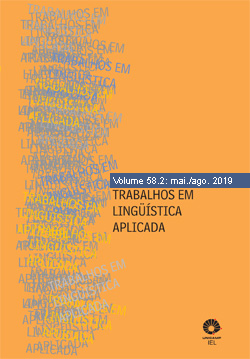Abstract
If post-humanism interrogates the exceptionality of the human, and if, on the other hand, verbal language is an expression of such exceptionality, then the post-humanization of language reveals a fundamental tension: understood as the externalization and automation of verbal language by means of computational devices (programmed to generate linguistic utterances in a relatively autonomous way), the post-humanization of language disturbs not only the centrality of the human, considered in the framework of the Enlightenment tradition, but also the notion that language is an exclusively human phenomenon. This article reflects on automatically generated language from the perspective of literary studies and draws on some of the central questions that emerge from the cross between cybernetics, language and literature. What happens to language when it is algorithmically processed and generated? How can the processes of symbolic representation and production be thought of in the context of artificial linguistic agents? When and how does an automatically generated text become a poem? By means of the analysis of a poetic experiment that can be considered as post-human, in the sense that it makes use of algorithmic tools and processes for the generation of language, we will highlight some of the tensions between computational devices and authorial writing, questioning the possibility or the impossibility for the literary to enroll in the cybernetic field of automation and demonstrating the limits of the humanization of machinic language.
References
BARBOSA, Pedro & CAVALHEIRO, Abílio. (1996), Teoria do Homem Sentado, Porto, Edições Afrontamento.
BARTHES (1973), Le Plaisir du Texte, Paris, Editions du Seuil.
BERGSON, Henri (2007), The Creative Mind: An Introduction to Metaphysics [1946], Transl. Mabelle L. Andison, N.Y., Dover Publications.
GUERREIRO, Ricardo (2015), Redes Mediadas por Computador na Composição e Performação de Situações Musicais Interactivas, Tese de Doutoramento em Ciência e Tecnologia das Artes, Universidade Católica Portuguesa. Acedido a 19.05.2019: https://repositorio.ucp.pt/bitstream/10400.14/19353/1/RicardoGuerreiro_Disserta%C3%A7%C3%A3o.pdf
Jhave (2015), “ELO 2015 — Bergen – Performance”, BDP: Big Data Poetry. Acedido a 19.05.2019: http://bdp.glia.ca/elo-2015-bergen-performance/
PORTELA, Manuel (2017), “Writing under constraint of the regime of computation”, The Bloomsbury Handbook of Electronic Literature, Tabbi, Joseph (Ed.), Bloomsbury Academic
HARAWAY, Donna (1991), “A Cyborg Manifesto: Science, Technology, and Socialist Feminism and the Privilege of Partial Perspective”, Simians, Cyborgs and Women: The Reinvention of Nature [1984], London, NY, Routledge. Acedido a 19.05.2019: https://monoskop.org/images/f/f3/Haraway_Donna_J_Simians_Cyborgs_and_Women_The_Reinvention_of_Nature.pdf
Trabalhos em Linguística Aplicada uses a Creative Commons (CC-BY) license, thus preserving the integrity of the articles in an open access environment. Journal authors retain the copyright of their work by licensing it under the Creative Commons Attribution license, which allows articles to be reused and distributed without restriction, as long as the original work is correctly cited.
Intellectual Property and Terms of Use
All content published in Trabalhos em Linguística Aplicada, unless otherwise specified, is under the Creative Commons Attribution License (CC-BY). This allows the material to be shared and adapted without restriction, as long as due credit is given and any changes made are indicated.
The authors retain the copyright to their work and take full responsibility for its content in the event of any challenge by third parties. The opinions expressed by the authors of the articles are their sole responsibility.
TLA reserves the right to make normative changes to the originals, such as changes to spelling and grammar to comply with the cultured norm of the language, as well as adjustments to form related to the editorial standard of the journal.


